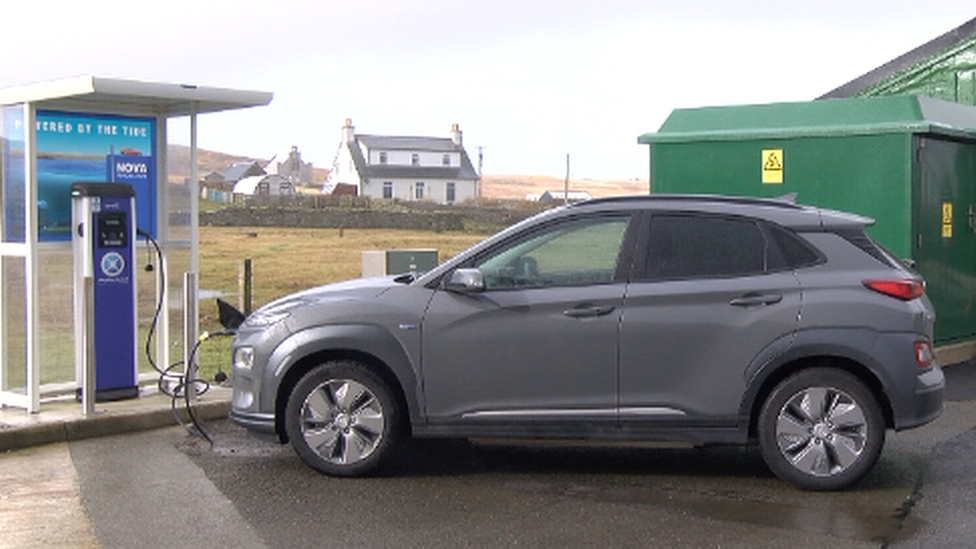The journey from black gold to green
- Published
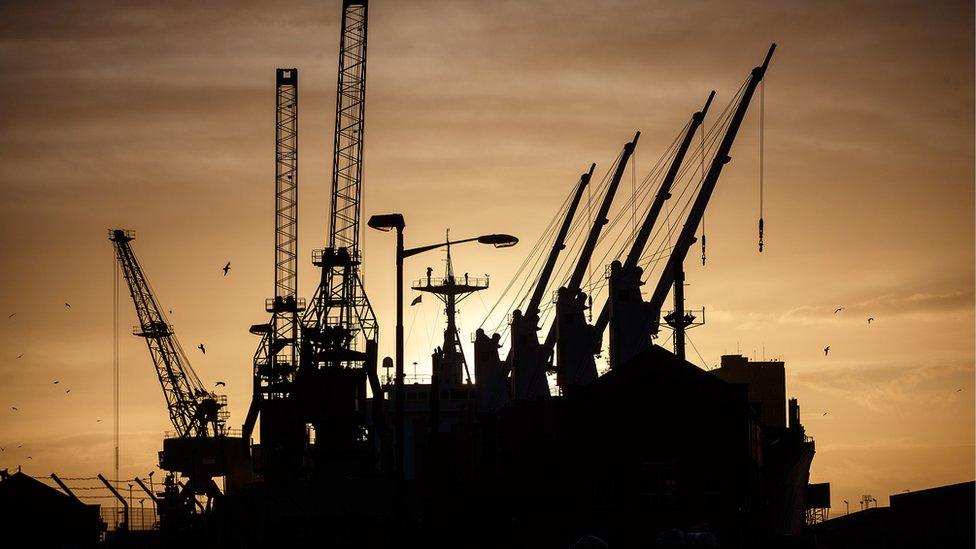
Two reports this week tackle the tough choices of how to reduce harmful emissions in a country with a big oil and gas industry.
One seeks to make that transition a fair one: the other signals that further drilling will have to be justified.
Local capture of the economic benefits of that shift is a priority in both cases: if not, support for this vast project cannot be taken for granted.
Claiming 150,000 jobs - direct and indirect - supporting high value exports, avoiding high cost imports, driving technology and productivity, and providing some energy security in an insecure world: the oil and gas industry in the UK is a big deal.
So it ought to be a big deal also when it transitions to something very much greener. That process is under way, and a significant milestone is reached with the North Sea Transition Deal (UKTD), agreed between the industry, its regulator and the UK government.
Published on Wednesday, it was preceded this week with a "Just Transition" report by a Scottish government-appointed commission:
by planning ahead, trying to align another round of industrial change with fairness:
support to those affected, helping them gain the skills to share in the benefits and to avoid paying the price:
buy-in from communities, to control transition rather than having it done to them, with an emphasis on wellbeing more than economic benefit.
It calls for this to be a "national mission - a collective endeavour".
Both reports carefully tiptoe round the reality for the economy of north-east Scotland in particular, and for those tens of thousands employed in extracting oil and gas. Oil and Gas UK has claimed that one in 25 Scottish jobs is dependent on the industry.
These reports also try to walk the very narrow line between maximising the remaining value from oil and gas under the seabed, and being true to the rhetoric about climate change.
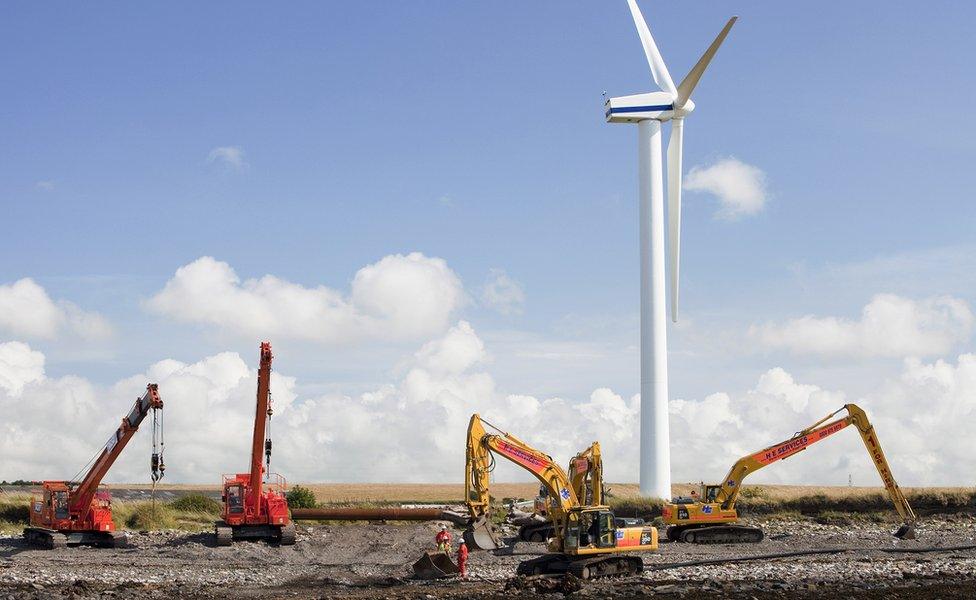
The NSTD talks of sustaining and creating up to 40,000 jobs in the transition to greener energy, which looks like a drop of around 70% in employment, though it can be assumed there will be some continued employment in offshore oil and gas for the decades it is expected to keep producing.
The Transition Deal also talks of £16bn of joint investment by government and industry to make the transition take place, but it's hard to see where the UK government is committing funds with which to leverage a lot of buy-in from industry.
The statement issued last night highlighted £27m in the recent Westminster Budget to help Aberdeen develop as a transition zone - helpful, but a very small share of what will be necessary.
The intention is to spend £3bn of the total on cleaning up the dirty business of extraction, which represents a thirtieth of all the UK's entire greenhouse gas emissions.
Flaring of excess gas can be further cut back, and gas-burning generators on offshore installations can be replaced with renewable power sources. Norway is ahead of the UK in linking its offshore platforms to its hydro-powered grid, and feeding power from offshore wind turbines direct to nearby oil platforms.
A further £3bn is being earmarked for carbon capture and storage. That remains a very expensive way of cutting emissions from burning, but is liked by the industry because it allows continued extraction of oil and gas.
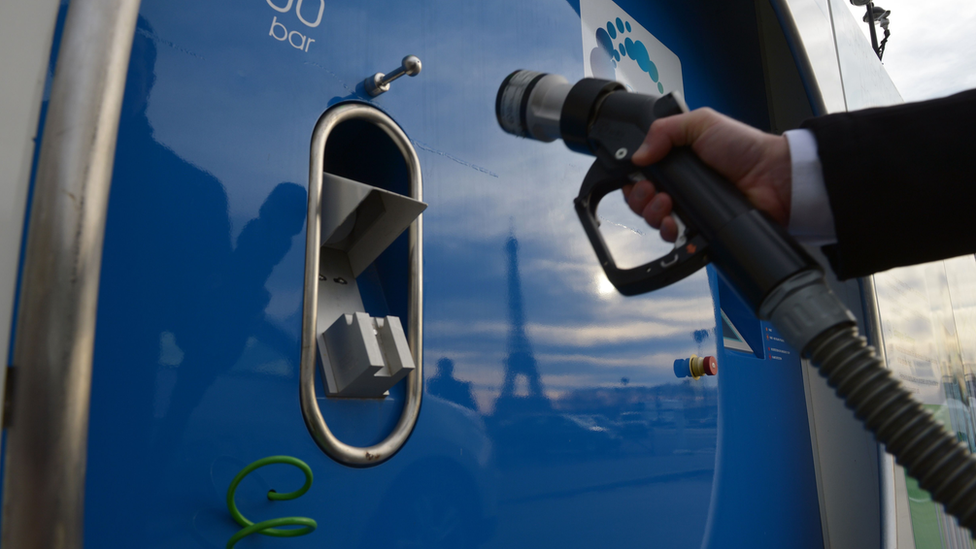
Hydrogen is one of the leading candidates for a "future fuel"
The big £10bn ticket in the NSTD is hydrogen power - touted as The Next Big Thing in energy. Separating hydrogen from oxygen in water, it could be a big element in replacing gas for heating and in heavy transport such as trains and trucks.
Where the NSTD gets into most trouble with environmental critics is in allowing continued drilling for new reserves of oil and gas. Denmark recently took a lead in ending new exploration.
The UK intends to allow its continuation, subject to a "dynamic checklist"; is there continuing demand for oil and gas?: how do new fields fit with other production levels?: how well are cleaner technologies developing?: is the hydrocarbons industry meeting its targets for reduced emissions?
The energy department in Whitehall says it will refuse permission for new drilling if the assessment doesn't pass climate change muster: "If the evidence suggests that a future licensing round would undermine the UK's climate goals or delivery of Net Zero, it will not go ahead".
Green campaigners already sound sceptical about that process. But this goes further than other major economies have done in signalling that climate change rhetoric ought to require difficult decisions to rein back on a valuable resource, keeping it under the seabed.
Trade unions may also feel a little sceptical when they see the commitment to ensure the transition deal guarantees a share of the economic benefit from investing in greener energy technology.
That is a sore point for those watching the sorry saga of manufacturing jobs that have failed to materialise in this "Saudi Arabia of renewable energy".
The oil and gas industry may be up for local sourcing. The deal states: "By 2030, the sector will voluntarily commit to ensuring that 50% of its offshore decommissioning and new energy technology projects will be provided by local businesses, helping to anchor jobs to the UK".
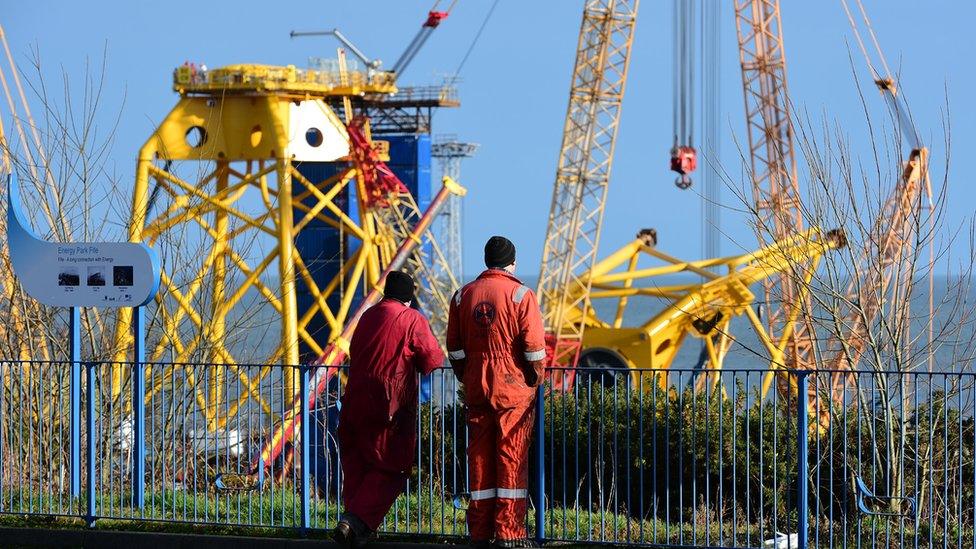
Despite many wind turbine projects going ahead, a disappointing share of work has come to Scotland's manufacturing yards
But the renewables industry is being driven by the UK government's choice of price incentives that push contractors to choose suppliers in countries with lower costs and bigger scale.
From the Just Transition Commission comes a warning of pushback against climate change measures: "There are significant concerns amongst some workers, communities and their representatives that, based on experiences to date, the transition will not lead to substantive new opportunities, and will be anything but just in the way it impacts them".
It goes on to warn of over-harsh regulation and closure of energy intensive industries - not only energy, but chemicals, for instance - if the consequence is that emissions are offshored to countries with less stringent regulation.
The North Sea Transition Deal highlights the ambitions for offshore oil and gas to play a vital part in a vast transformation now gathering pace, which will affect every home and business. But it also highlights some of the difficulties in making it a reality.
- Published22 March 2021
